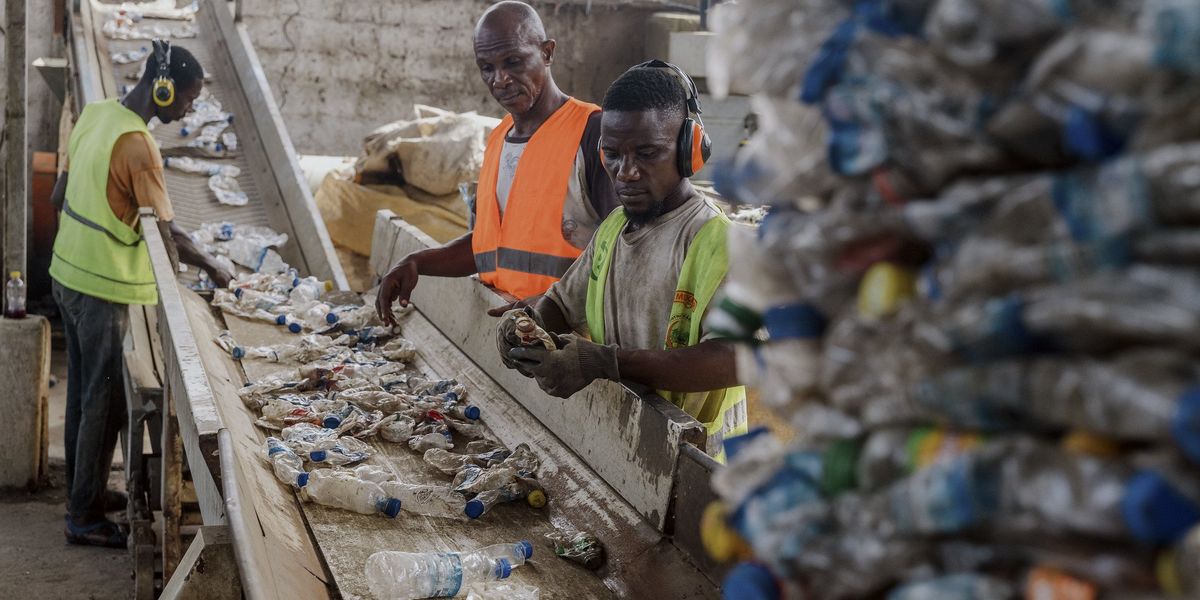
Plastics contain toxic chemicals that can enter products and interact to create new harmful substances during the recycling process, a new report from Greenpeace and the International Pollutants Elimination Network (IPEN) shows.
The report comes as negotiators from more than 180 nations meet in Paris this week to discuss a global plastics treaty, developing regulations to address the plastic pollution crisis. The backdrop is stark: Plastics production is currently on track to triple by 2060, causing harm to human health and the environment throughout its lifecycle from creation to disposal.
Capping plastics production is a key point of debate. Fifty-eight countries, aligned in a group called the High Ambition Coalition to End Plastic Pollution, want to see a treaty that slows production. Industry groups and countries that stand to profit from plastic production want to focus on waste management and recycling instead, according to scientists and advocates.
Plastics manufacturing is one of the largest industries in the U.S., but the country is still committed to a treaty with “strong binding provisions, not only voluntary actions,” said Jose Fernandez, under secretary of state for economic growth, energy and environment, at a High Ambition Coalition briefing. The U.S. is not a member of the coalition, instead calling for the treaty to direct nations to develop individual action plans.
Current plastic recycling systems “mold this unknown cocktail of potentially harmful substances together,” Melanie Bergmann, a biologist at the Alfred Wegener Institute and a member of the Scientists’ Coalition for an Effective Plastics Treaty, who was not speaking on behalf of the coalition, told Environmental Health News (EHN).
That chemical cocktail can harm workers and communities around recycling sites and leach from recycled plastic products, the Greenpeace and IPEN report found.
Chemical additives in plastic

Only 9% of plastic is recycled and the rest is burned in incinerators, left to pollute nature or tossed in landfills that are often located in low and middle-income countries. But increasing recycling isn’t a viable solution, scientists and advocates point out. Plastics contain toxic chemicals, such as bisphenols (like BPA), phthalates and per- and polyfluoroalkyl substances (PFAS), and can also absorb materials from other products in the wastestream, like pesticides and pharmaceuticals, which can later leach out of the plastic. IPEN and Greenpeace advocate for limiting plastic production alongside eliminating toxic chemicals added to plastics to make safe recycled products feasible.
Related: UN plastics treaty should prioritize health and climate change
Fossil fuels are the raw material that makes plastic, and more than 13,000 chemicals are added to change durability, flexibility, color, UV-protection and more. Roughly 3,200 of those chemicals are considered a concern for human health, and an additional 6,000 have never been screened, according to a report from the United Nations Environment Program.
“Six thousand with no data is like driving blind,” Bjorn Beeler, international coordinator at IPEN, told EHN. Many chemicals added to plastics are linked with health risks including cancers, hormonal system disruptions and reproductive harms.
Plastic production cap
One solution involves simplification and transparency of ingredients in plastics. Lists of approved and unsafe chemicals could guide production and improve the safety of the end material, Bergmann said. Full transparency of ingredients could also help improve recycling and reduce the risk of creating new toxics.
But, “the single most important measure that we need to take is a cap on plastic production,” she said.
A statement released Friday by the High Ambition Coalition echoed this, saying the treaty must reduce plastic production and consumption. “We need to first close the tap by addressing the unsustainable sourcing and extraction of raw materials to make plastics,” Sir Molwyn Joseph, Antigua & Barbuda’s minister of health, wellness and the environment said at a briefing that day.
He emphasized that, as with climate change, developing countries contribute little to the plastic pollution crisis but bear the brunt of the impact. “We have a very small window to address and arrest the severe damage being done by plastics not only to the environment but to human health,” he said.
The mandate for the treaty was agreed on in March 2022, and is currently in its second of five weeks of discussions, spread across three years. The first meeting in late 2022 focused on procedures for the talks, and this week negotiators are expected to dive into substantive issues.
So far, some countries including Saudi Arabia, Russia, India and China have held up talks with procedural issues, opposing the possibility of a vote on a final treaty if consensus can’t be reached. These are countries that profit significantly from the production of fossil fuels, plastics or petrochemicals.
Countries’ ability to agree on a treaty objective will be the measure of success for the week, Beeler said. He hopes to see an objective to protect the environment and human health from adverse impacts at all stages of the plastic lifecycle.
“We are now more than one year into negotiations,” said Jeanne d’Arc Mujawamariya, Rwanda’s minister of environment, at the High Ambition Coalition briefing. “However, since then more than 400 million tons of new plastic have been produced and another 22 million tons of plastic waste has ended up in nature…We need to move quickly into treaty-making mode.”

